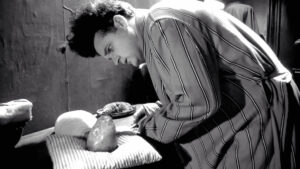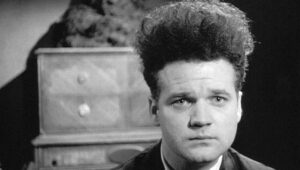Publication Date: 01-16-2025
Eraserhead (1977) review
Dir. David Lynch

By: Steve Pulaski
Rating: ★★
 Remembering David Lynch
Remembering David Lynch 
 1946 – 2025
1946 – 2025 
Before settling down to watch David Lynch’s directorial debut Eraserhead, I took note of a curious feature on the Criterion Collection DVD – “TV Calibration.” I figured perhaps there was some anamorphic ratio I had to set my television to in order to properly appreciate what is often regarded as Lynch’s masterwork. The instructions read to configure your television set’s brightness and contrast levels so a series of pitch-dark and burning-bright vertical bars become illuminated. Apparently this allows Lynch’s blacks and whites in color-contrast to be shown as they should be. I’d recommend doing it even if the film itself may or may not be worth the extraneous labor.
For all the talk of the film’s influence, scope, and impact, Eraserhead was a disappointingly sterile and mostly uninteresting watch for me, especially considering how his later work, The Elephant Man, wowed me with its terrifying narrative and visuals. The film shows the work of a prodigy stylist who struggles to create characters or develop an engaging story that appeals to audiences on a level that’s not visual. At some point, especially given the strengths of Lynch’s short films and later works, aesthetics and mood don’t cut it before the film begins to position itself as anti-audience.
To boil things down, for your sake and my own, the film revolves around Henry Spencer (Jack Fisk in a performance mannered and controlled right down to quarter-inch movements), a disillusioned soul living in an industrial hell drowned out by grayscale, with dirt and filth crowding his apartment. He goes to dinner with his girlfriend Mary X (Charlotte Stewart) and her parents, despite receiving some off-handed vibes from her parents before the two return to their humble abode in order to care for their child. Their child is a repulsive, slithering creature with an alien-like face and an amphibian torso that lies motionless in a bundle of gauze, crying and wailing through all hours of the night.
At one point, Mary packs up and leaves, forcing the care of the child onto Henry only, as he only grows increasingly distant from the world around him. He’s encased by a vacuous environment that looks as if it was once home to a booming factory with many jobs and a prosperous economy. Now, it’s desolate and irreparable, housing the rejects of human society, and Henry is strung along with the hope his attractive neighbor (Judith Anna Roberts) will be his saving grace until that dream falls apart too.
But what does it all mean, is the appropriate question to ask here? We can stare at Lynch’s admittedly hypnotic opening sequence all day, where Henry’s head is transparent as it appears to be floating in the foreground before the sky while a planet finds itself proper alignment inside of his head, but when the film tangles itself into a web of surrealist imagery and ideas do we realize that maybe what Lynch is trying to say is that he doesn’t know what he’s trying to say.

Perhaps that’s a lazy cop-out to you as much as I feel it is to me too. Eraserhead shows signs of being a twisted, surreal dramatization of domesticity and fatherhood, especially given Henry’s rapid descent into insanity that’s accelerated upon Mary leaving. Yet with Lynch, you never totally know. A film like this needs more explicitly realized themes that aren’t nudged out of the way by Lynch doing all of his own stunts with camera angles, editing, and writing. Perhaps because he trusted people other than himself with cinematography details, Frederick Elmes and Herbert Caldwell, is why that seems to be the standout feature while the rest is bogged down with grimy, purposeful ambiguity.
The sound design and visual scheme in Eraserhead actually echoes that of Un Chien Andalou, a short film from 1929 that is often regarded as the force that kickstarted surrealism in film, with a staccato, disjointed narrative cast over what was basically a running montage of the grotesque. Various similarities in tone exist too, and Lynch’s commitment to a narrative that’s never totally developed nor never fully explained shows his intention to obscure, which successfully bred frustration on my behalf. There’s nothing wrong with being open-ended or vague, but the opaque qualities of Eraserhead make it a terribly unengaging experience. Once you appreciate Lynch, Elmes, and Caldwell’s commitment to style and atmosphere, the film doesn’t carry much weight after that and ostensibly seeks to alienate. It’s not a comfortable movie experience because it challenges your thinking or how you view the world; it challenges your patience and your tolerance for deliberately empty storytelling.
One commendable attribute that retains its effectiveness from the moment it’s introduced to the moment the credits role is the screams of the infant mutant, which pierce the ears of Henry and Mary as well as the audience through tremendous sound design. Lynch has always had a great time testing the weight the moving, essential elements to an atmospheric film can bear – one to do that over create characters with discernible personalities – and through his constant need to go further, his debut feature includes some immaculate moments of sound design. The bloodcurdling screams of the baby are not only heard but felt by the audience, and their frequent, looming presence that gets us to anticipate them like we’re Henry going off the deep end is superb.
You might appreciate Eraserhead and its commitment to aesthetic and its admirable rejection of narrative storytelling and framing. You might even find a subtext I apparently cannot. Or, like me, you’ll be a bit annoyed you tinkered with the brightness and contrast settings of your TV for fifteen minutes for a film that made the whole experience akin to shaving your legs with intent to spend the evening inside.
My review of The Grandmother (1970)
My review of The Elephant Man
My review of Dune (1984)
My review of Blue Velvet
My review of Mulholland Drive
Starring: Jack Fisk, Charlotte Stewart, and Judith Anna Roberts. Directed by: David Lynch.
About Steve Pulaski
Steve Pulaski has been reviewing movies since 2009 for a barrage of different outlets. He graduated North Central College in 2018 and currently works as an on-air radio personality. He also hosts a weekly movie podcast called "Sleepless with Steve," dedicated to film and the film industry, on his YouTube channel. In addition to writing, he's a die-hard Chicago Bears fan and has two cats, appropriately named Siskel and Ebert!

